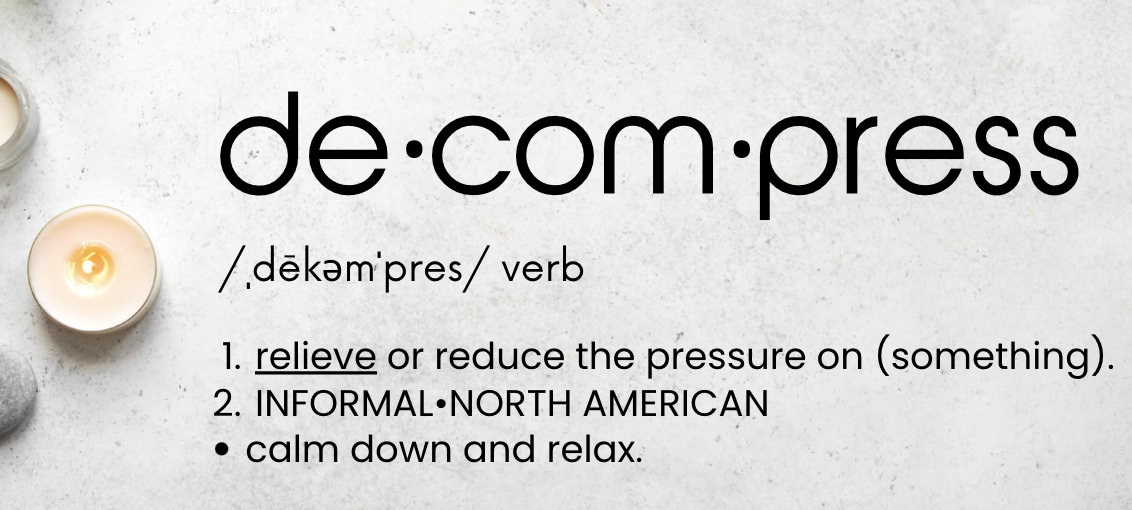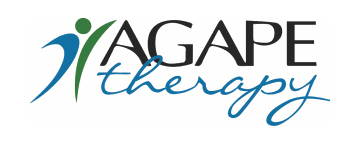
12 Oct The Compression of Life: How to Decompress Physically and Mentally
While I (Riley) am working with a stretching client, my mind often starts to wander. I create a dark, quiet environment to help my client relax and release tension, and that environment also allows me quiet time in an otherwise busy day. However, I usually can’t help but think about my to-do list or what is next up on my schedule. While I was working on helping my client decompress (in the literal sense of creating space between their vertebrae in their spine), I got to thinking about all the ways life can compress us.
In the literal sense, gravity and poor posture compress our spine and joints every day. In the figurative sense, our busy schedules and constant striving to do more and be more can compress us mentally. If we aren’t careful, the compression can start to feel constricting. Luckily, just as life can compress us, it also gives us ways to decompress. Here are a few of my favorite ways to practice decompression.
The Physical Compression: Aches, Pains, and Tension
The physical compression we experience in our daily lives often manifests as bodily aches, muscle tension, and poor postures. Hours spent hunched over desks or smartphones, couples with the stress of daily life, can lead to discomfort and pain
Move Regularly: Incorporate stretching and movement breaks into your day. Simple movements like neck and shoulder rolls and toe touches can alleviate muscle tension.
Exercise Mindfully: You don’t need to beat yourself up to ‘exercise’. I think there is a common notion that exercise needs to be hard, and you need to leave sweating and exhausted. Instead, find physical activity that suits your body’s needs. Activities like Pilates, yoga, or even a leisurely walk can decompress your muscles and clear your mind.
Assisted Stretching: We offer assisted stretching through our StretchYOU Program. We have Certified Stretch and Flexibility Coaches on staff who are eager to help guide you through targeted stretches to release tension and enhance mobility. Assisted stretching is a powerful practice that goes beyond physical flexibility. It can also serve as a means to decompress the body, both mentally and physically. As our certified coaches gently guide you through a series of stretches, it not only releases tension in your muscles and improves mobility, but also encourages a deep mind-body connection. The focused attention on your body’s movements and sensations can act as a form of mindfulness, reducing mental stress and promoting relaxation.
The Mental Compression: Stress, Anxiety, and Overwhelm
Mental compression often takes the form of stress, anxiety, and an overwhelming sense of responsibility. The constant juggling of tasks and worries can leave us mentally fatigued.
Set Boundaries: Learn to say no when needed. Saying no can help reduce the figurative compression of responsibilities and commitments. It can be very hard to say no, especially to helping others, so try offering alternative solutions, such as suggesting someone else who might be available to take on the task or proposing a more suitable time in the future when you’ll have the bandwidth to handle the extra responsibility effectively.
Unplug and Disconnect: Take digital detox breaks to unplug from the constant barrage of information and comparison. Give your mind the space it needs to decompress.
Practice Self-Care: When is the last time you did something just for you? Think of one thing that brings you joy and/or relaxation, and schedule a time to do that activity in the next week.
Remember that decompression is not a one-size-fits-all solution. It’s about finding what works best for you and incorporating these practices into your daily life. By taking deliberate steps to decompress both physically and mentally, you can create a more balanced and harmonious life, one that allows you to navigate the compression of life’s challenges with grace and resilience.


